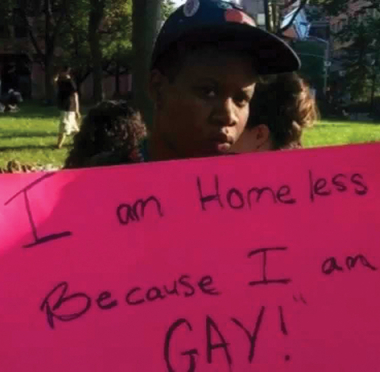Protecting black LGBTQ+ youth

By Mahkesha Hogg
LGBTQ+ Black Issues Columnist
Many black LGBTQ+ youth face discrimination due to the intersectionality of being black and LGBTQ+. This discrimination is from both the black community and the straight, cisgender community.
We must protect them, stick up for them, dismantle systems of oppression and provide mentorship to them.
The Human Rights Campaign (HRC) compiled a report called the Black & African LGBTQ Youth Report which collected data of experiences of some of these youth. It is not shocking that “77 percent of black and African American LGBTQ+ youth have heard family members say negative things about LGBTQ+ people.”
The foundation of any child’s life experience comes from their families.
Sometimes a black child never hears anything anti-LGBTQ+ until they come out or have friends who are LGBTQ+. I was 26 years old when I found out I had an anti-LGBTQ+, and quite bigoted, parent. I had no idea this parent felt this way nor was any slur ever said around me. I learned the way my parent felt about the community after I announced I was going to become an activist for the queer community.
You can’t mention black bigotry without mentioning how it’s tied to Christianity. I wish some black folks would realize that using the bible as a weapon does so much harm to the LGBTQ+ youth who look up to them for guidance and approval.
These youth are constantly fighting forces from the inside and outside their circles. It is quite the burden to try and appease family through denial of yourself, go through the pressures of middle/high school, and navigate the world of white supremacy and heteronormativity.
I know it’s hard to get black issues addressed in school systems, let alone black LGBTQ+ issues. It is imperative that these issues are taken seriously, and counselors are equipped with the knowledge of how to handle them.
The HRC report also talks about how ill-prepared counselors are or are resistant to helping black LGBTQ+ youth. Many schools forbid positive LGBTQ+ discussions. The lack of black counselors, queer and black teachers all contribute to the disparities.
Eighty percent of the youth reported feeling down and depressed. These youth suffer in silence most of the time. I wish I could say I knew a lot of black LGBTQ+ in Oklahoma, but I don’t. I have seen many more present at OKC Pride over the last few years.
At festivals, they are exposed to youth organizations we have, especially Guiding Right, Inc., who focuses on African American HIV/AIDS prevention and treatment (see story on page 24). There are also focus groups geared toward all identities on the LGBTQ+ spectrum.
So, what can we do to help these youth thrive? We need the help of everyone – faith leaders, community advocates, schools, families, friends, health professionals, policy makers, and citizens to start providing safe spaces and culturally relevant materials allowing for dialogue.
We must start acknowledging that many black youths are bisexual. I was shocked to know the majority of the respondents to the survey were bisexual. In the black community, many see you as either gay or straight. It seems to confuse everyone by saying you are attracted to both.
Many times, black bisexuals are seen as confused or selfish. These terms are not accurate. There are many things we can do to allow these young people to flourish.
Let’s try as hard as we can to make them feel safe. The lives of our black youth may very well depend on it.
The Gayly 5/25/2019 12:42 p.m. CST





